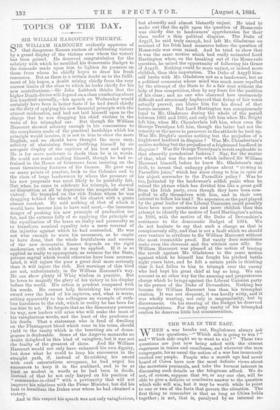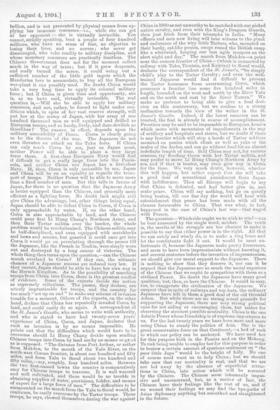THE WAR IN THE EAST.
WHEN a war breaks out, Englishmen always ask two questions,—" Which aide is going to win ? and" Which side ought we to want to win P" These two questions are just now being asked with the utmost eagerness in trains and omnibuses, and wherever else men congregate, for as usual the notion of a war has immensely excited our people. People who a month ago had never heard of Corea have now the most definite views about the mountain peninsula, and take the keenest interest in discussing such details as the telegrams afford. We do not, of course, suppose that we, or any one else, will be able to give a definite or conclusive answer to the question which side will win, but it may be worth while to point to one or two of the facts that govern the situation. The first thing to remember is that as long as China holds together ; is not, that is, paralysed by an internal re- hellion, and is not prevented by physical causes from ap- plying her immense resources—i.e., while she can get at her opponent — she is virtually invincible. You cannot, strictly speaking, beat a people of four hundred millions, who have no sense of fear, no objection to losing their lives, and no nerves ; who never get discouraged, who take readily to military discipline, and whose monetary resources are practically limitless. The Chinese Government does not for the moment collect much in the way of taxes ; but if it grew desperate, and really turned the screw, it could wring out a sufficient number of the little gold ingots which the Mandarins love to accumulate, to buy all the European war-plant it can possibly need. No doubt China would take a very long time to apply its colossal military force ; but if China is given time and opportunity, she is, as we have said, virtually invincible. The real question is,—Will she be able to apply her military resources, and not, rather, be forced to fight under con- ditions which, in spite of her vast reserve strength, will put her at the mercy of Japan, with her army of one hundred thousand men as well equipped and drilled as European troops, and as hardy, lively, and dare-devilish as Goorkhas ? The answer, in effect, depends upon the military acceEsibility of Corea. Corea is clearly going to be the theatre of the war. The Japanese do not even threaten an attack on the Taku forts. If China can only reach Corea by sea, just as Japan must, neither Power will be able to place a very large force there. A firet.elass European Navy would find it difficult to get a really large force into the Penin- sula, and neither China nor Japan has a first-class Navy. If, then, Corea is only accessible by sea, Japan and China will be on an equality as regards the trans- port of troops. Neither Power will be able to move more than a fixed. number of men. But this tells in favour of Japan, for there is no question that the Japanese Army is better equipped than the Chinese, and generally more efficient as a fighting force. No doubt luck might still give China the advantage, but, other things being equal, Japan should be able to defeat China in Corea, if Corea is only approachable by water. If, on the other hand, Corea is also approachable by land, and the Chinese could pour first Li Hung Chang's Northern Army, and then their Tartar militia over the border, the whole problem would be revolutionised. The Chinese militia may be half-disciplined, and even equipped with matchlocks and bows and arrows, but granted it could once get into Corea it would go on percolating through the passes till the Japanese, like the French in Tonkin, were simply worn out and destroyed by a long course of victories. The whole thing then turns upon the question,—can the Chinese march overland to Corea ? If they can, the ultimate chances of a Japanese success are reduced very low. If they cannot, Japan should be able to have her own way in the Hermit Kingdom. As to the possibility of marching troops from China into Corea, there is the greatest conflict of evidence. Some of the experts deride the notion as supremely ridiculous. The passes, they declare, are utterly impracticable for troops, and the country far too much" set up on end" to make any scheme of invasion tenable for a moment. Others of the experts, on the other hand, declare that China has repeatedly invaded Corea by land, and could easily do so again. A correspondent of the St. James's Gazette, who seems to write with authority, and who is stated to have had twenty-seven years' experience of China, Corea, and Japan, declares that such an invasion is by no means impossible. He points out that the difficulties which would have to be overcome should Li Hung Chang decide upon sending Chinese troops into Corea by land are by no means so great as is supposed. "The distance from Port Arthur, or rather from Mukden, to the mouth of the Yalu River, on the north-west Corean frontier, is about one hundred and fifty miles, and from Yalu to Seoul about two hundred and fifty miles,—say, roughly, four hundred miles. Between the two first-named towns the country is comparatively easy for Chinese troops to traverse. it is well watered and well cultivated, and there would be no trouble in obtaining supplies of water, provisions, fodder, and means of export for a large force of men." The difficulties to be surmounted on the march from the Yalu to Seoul would, he continues, be easily overcome by the Tartar troops. These troops, he says, showed themselves during the war against China in 1860 as not unworthy to be matched with our picked native cavalry, and even with the King's Dragoon Guards, then just fresh from their triumphs in India. "Many officers and men now living will bear witness to the pluck and endurance of the wiry little Tartars, who, mounted on their hardy, cat-like ponies, swept round the British camp like a whirlwind, keeping our less agile troopers on the alert night and day." The march from Mukclen—a point near the eastern frontier of China—(which is connected by railway with Taku, Tientsin, and Kaiping) to Seoul would, declares the correspondent of the St. James's, "be simply child's play to the Tartar Cavalry ; and even the well- trained Japanese would find it difficult to prevent the Tartar horsemen from overrunning Corea, which possesses a frontier line some five hundred miles in length, bounded on the west and north by the River Yalu and on the north and east by the River Tuman." We make no pretence to being able to give a final deci- sion on this controversy, but we confess to a strong inclination towards the view of the writer in the St. James's Gazette. Indeed, if the latest rumours can be trusted, the feat is already in course of accomplishment. Frontiers may be said to be impassable to European Armies which move with mountains of impedimenta in the way of artillery and hospitals and stores, but we doubt if there is any frontier which will stop a horde of Tartar soldiers mounted on ponies which climb as well as yaks or the mules of the Andes, and can go without food for an almost. indefinite length of time. Still China may not, for various reasons, try flooding Corea with her Tartar militia, and may prefer to move Li Hung Clang's Northern Army by sea, and if that is beaten, may even give way in Corea for the time. We very much doubt, however, whether this will happen, but rather expect that she will take a good deal of sensational punishment from japan with indifference. Then all Europe will begin to say that China is defeated, and had better give in, and make peace. China will say nothing, but go on quietly being beaten, till one fine day the world will hoar with astonishment that peace has been made with all the clauses favourable to China. That was what, in fact, happened. in the case of China's last war—that waged with France.
The question—Which side ought we to wish to win?—can be best answered by the single word, neither. The truth is, the merits of the struggle are too obscure to make it possible to say that either power is in the right. All that we can safely and wisely do, is to make a ring fence and let the combatants fight it out. It would be most un- fortunate if, because the Japanese make pretty firescreens, and seem to have been impressionists without knowing it, and several centuries before the invention of impressionism, we should give our moral support to the Japanese. There is nothing to show that they deserve it, nor can it be argued that the Japanese are so much the moral superiors of the Chinese that we ought to sympathise with them as a civilised Power. No doubt the Japanese have many good qualities; but, then, so have the Chinese. It would be easy, too, to exaggerate the civilisation of the Japanese. We suspect that in spite of railways and top-hats, the ordinary Japanese have left in them a good deal of the old Oriental Adam. But while there are no strong moral grounds for supporting the Japanese, there are very strong political ones for not aiding or encouraging them' but rather for observing the strictest possible neutrality. China is the one Asiatic Power whose friendship is of supreme importance to us. For the last twenty years we have been more and more using China to steady the politics of Asia. She is the great conservative force on that Continent,—a bed of rock to which our policy can be anchored. We have used her for this purpose both in the Pamirs and on the Mekong. To risk being unable to employ her for this purpose in order to bestow a certain amount of spurious sentiment on "the poor little Japs " would be the height of folly. No one of course need want us to help China ; but we should take care that our neutrality is real, and that we are not led away by the absence of superficial attrac- tions in China, into action which will be resented by the Chinese. The Chinese seem inhumanly impas- sive and unconcerned, but, as a matter of fact, the Chinese have their feelings like the rest of us, and if we wound their feelings we may find the bye-paths of Asian diplomacy anything but smoothed and straightened in the future.



































 Previous page
Previous page